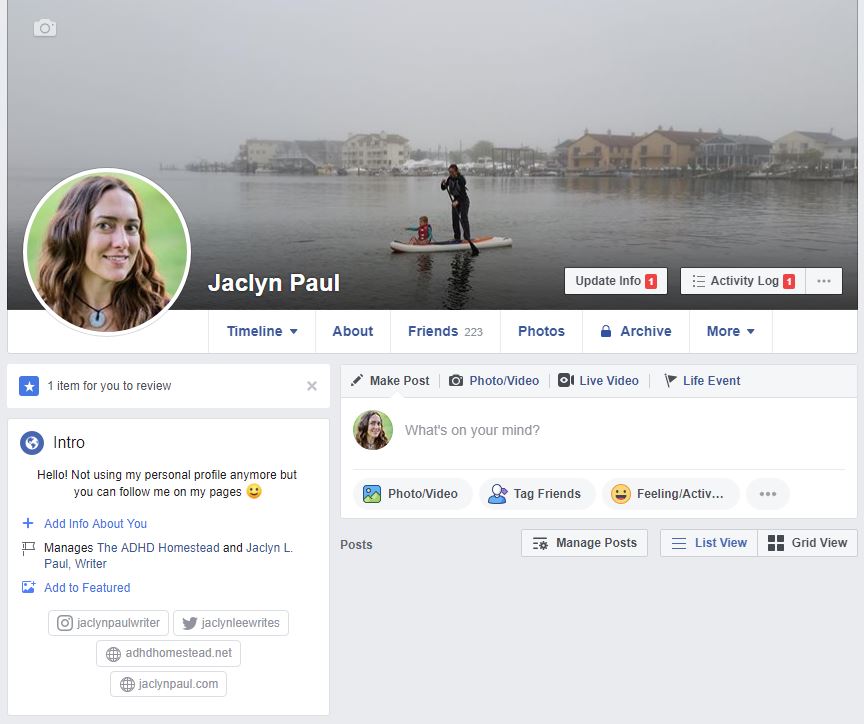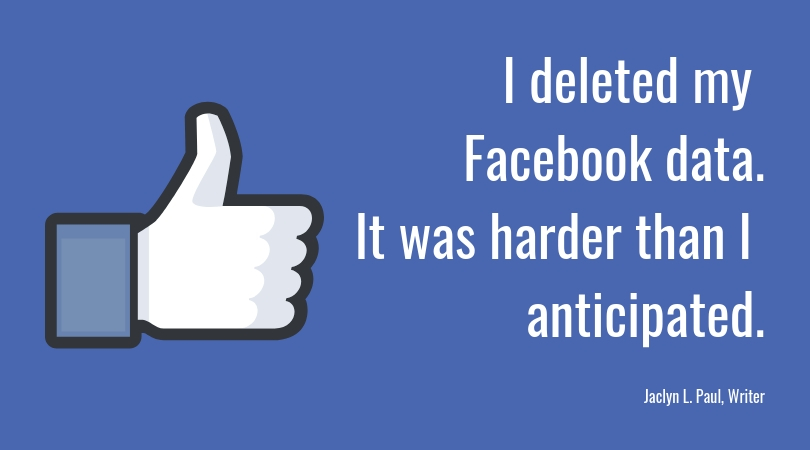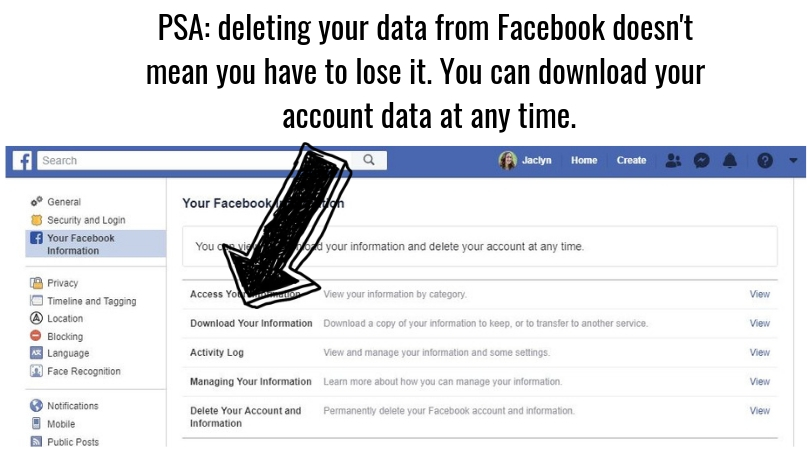Almost a year ago, I stopped using my personal Facebook profile. The contempt and incivility around the 2016 election left a bad taste in my mouth. Subsequent articles I read about how Facebook can affect our beliefs and relationships further soured me on the experience. Beyond that, though, I noticed how good it felt to take a break. Despite all the validation I sought from Facebook, I deeply appreciated the time I spent away from it.
I’d taken a big break once before: I deactivated my account for six months. For a variety of reasons, that wouldn’t work for me now. Facebook is an important part of my ADHD Homestead platform, and I have a few other group and page responsibilities I don’t want to abandon. I needed to step away from Facebook as a personal social platform without actually leaving.
The solution I found was imperfect, but it’s the best I think anyone can do right now. I used a browser extension to hide or delete all my personal content. Then I added a note in my bio to let people know I’m not using my profile anymore (and where to find me elsewhere). I disabled new posts to my timeline to ensure it would stay empty unless I decide to change it. While my profile still exists, it’s pretty clear it’s not in use.

What surprised me was how conflicted I felt about finally doing all of this.
Why I’m sharing my experience deleting Facebook (without deleting Facebook).
I deleted my Facebook content because I saw a friend do it. I’m no conformist, but I appreciate when my friends help me discover a smart idea. If you wish you could use some features of Facebook — like groups, marketplace, or pages — while getting rid of the rest, I hope this helps you sort that out.
Because it’s not easy, keeping one foot in and one foot out. Facebook has no tools to do this. I can’t simply disable the Timeline feature, for example. I had to do the best I could on my own.
Reasons it should’ve been easy.
I expected to have no trouble at all deleting my data. After all, I haven’t used my personal profile since January. It’s now November.
Plus, I had an offline copy of that data because I didn’t want to lose. My Facebook profile contained a decade of information. I’m the kind of person who has never gotten rid of a notebook. However, there’s a difference between keeping a shelf of old notebooks and maintaining a public-facing archive of those notebooks on the internet. I solved this problem by downloading a copy of my Facebook content before I deleted it.
The big delete should’ve been easy, then. I was removing content from a service I didn’t use (personal Facebook profile). I had all that data backed up (file saved on my hard drive). Piece of cake, right?
Reasons deleting my Facebook data was hard.
Nope, my celebratory purge wasn’t a piece of cake — or not exactly. First of all, the script I used to delete my data replicated what I would’ve had to do by hand: it selected each post and clicked delete. It’s one thing to click “delete” without seeing what you’re losing. I imagine it’s akin to your mom calling to ask if you want your childhood toys from her basement. You might be able to tell her to take the whole box to Goodwill, but what if she hands you the box?
It’s not like I disliked most of my Facebook posts. I wasn’t purging a batch of ill-advised party pics from college. I was deleting kind notes from friends, birthday wishes, funny links shared to my wall, family photos. This felt a lot like returning or throwing away a pile of thoughtful gifts — like I was rejecting the sentiment, as opposed to the thing itself.
I didn’t #deleteFacebook.
Nowadays, I use Facebook only for jobs it alone can do. My ADHD Homestead page has over 3000 fans. It’s part of my communications platform, and it has no logical replacement. Facebook is one of the most popular social media sites for my readership.
I use my personal Facebook profile for private messaging, events, and group participation.To access the site, I use bookmarks that take me straight to my group pages. I’ve disabled all notifications except the following: posts in groups I want to participate in, activity on my fan pages, private messages, and mentions/tags. I don’t use Facebook to socialize casually at all, nor have I looked at my news feed since January 2018.
How I #replaceFacebook.
Perhaps the most unexpected benefit of stepping back from social media in my personal life? I’m not taking every available chance to speak. Because my current social media life is 100% public and tied to my personal brand, I try not to post just to hear myself talk. I think carefully about my political posts and I feel no obligation to blast out a knee-jerk reaction to current events. I’m taking more time to think by myself, to read, to organize my thoughts before I pick up the social media megaphone. And most of the time I keep it offline, in real-life conversations with real people. Whether it’s a school snow day or an election, my Facebook friends don’t need to hear my every thought and opinion.
I’m also trying not to let myself fall out of touch with people I care about. Since leaving the Facebook water cooler behind, I’ve made a point to send more letters, postcards, emails, texts, and direct messages. I’ve made my social actions small and targeted again. I hope my friends and family appreciate those efforts, even if they aren’t as frequent as my daily posts to Facebook.
I’ve also learned to appreciate the value of sharing a bit of gossip over a beer or while helping to prepare a holiday dinner. There are people in every family who love having the latest news. In a way, Facebook puts them out of a job. If you already know everything because it’s all over Facebook, why would you need to catch up in person?
My notebooks, I realized, had endured a similar fate. At the height of my Facebook usage, my brain — because I’m a writer and I live and breathe narrative — actually started thinking in status updates. As I experienced an event in real life, my brain would automatically begin parsing it into the language of social media. Where I had once used my spare processing cycles to churn out real prose in my head, I now created fluff content for the benefit of others.
It’s not that I don’t appreciate seeing social media posts. I do. But that’s not what I want to write for myself, personally or professionally. Every time I caught myself composing status updates in my head, I asked myself, what’s the appropriate outlet for this? I started writing down blog post ideas, essay outlines, journal entries. I freed my mind to do the kind of thinking I wanted to do and left the validation-seeking world of social media behind.
For sure, I don’t judge anyone for using Facebook.
Ironically, Facebook is a significant part of my business. As much as I don’t like it for myself, I still use it professionally every day. It’s a great way to reach my audience. And I don’t think there’s anything wrong with that.
What I do hope for all of us is that we try to be intentional with our relationships, both to humans and to technology. We need to be aware of how technology affects our brains, our emotions, and our creativity. We need to be aware of how we can be manipulated on social media, whether it be by the platform itself, our own friends, or foreign actors. And we need to remember how to experience life through the lens of our own hearts and minds, not the post we’ll share about it on Facebook.
The best moments of my life happen not just when my phone is far out of sight, but when it’s also out of mind — when I’m not thinking about taking pictures and composing witty descriptions, but opening my eyes and letting myself experience life firsthand. And in a way, that’s what being a writer is all about.
I’d love to hear your experiences with social media — especially my fellow members of the Oregon Trail generation. We grew up without the internet, but we were also the world’s first Facebook users. How do you find balance between off- and online communication?


Leave a Reply